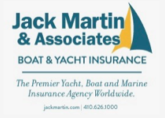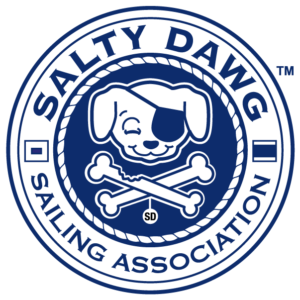What Is Needed for a Salty Dawg Rally?
EXPERIENCE, EQUIPMENT, AND PREPARATION
The Salty Dawg Sailing Association (SDSA) does not inspect vessels for seaworthiness or compliance with US Coast Guard requirements. Each owner or captain is responsible to ensure that their vessel meets all federal, state, and international requirements, and that the vessel, its captain, and crew are properly equipped and qualified to withstand the rigors of the passage to be undertaken while participating in a Salty Dawg Rally. Accordingly, the Owner/Captain is the best individual to inspect the vessel and equipment or to make the decisions to engage professional experts where he or she does not have the requisite expertise. The SDSA may provide recommendations and assist with any concerns from participants regarding preparations for an offshore passage.
However, each rally has a specific minimum experience requirement which must be met before the start of the rally. The SDSA reserves the right, in its sole discretion, to deny acceptance to a rally to any vessel or captain if it is determined that, the minimum level of experience has not been achieved, that the SDSA requirements and documentation have not been timely completed, or that the vessel is not adequately prepared for the specific rally by the rally start date.
RALLY CATEGORIES
The Salty Dawg Sailing Association has three rally categories:
- Near-Shore – These rallies stay inside the Gulf Stream and have, at most, two overnight passages. These rallies include the Delmarva, Downeast, and Maritime rallies.
- Offshore –These rallies cross the Gulf Stream and include the Caribbean, Homeward Bound, Bermuda and January Jump rallies.
- Trans-Atlantic –These rallies venture far offshore. Currently the only rally in this category is the Azores Rally.
REQUIRED EXPERIENCE
Acceptance to a rally is contingent upon having completed the required experience by the commencement of the rally. If you're not quite there yet, let's discuss the steps you can take to prepare and ensure that you're ready. If you will not have the necessary experience for an offshore rally, you may want to consider one of our near-shore rallies.
For all Rallies, including Near-Shore:
-
The owner or captain who will be responsible for the operation and safety of the vessel will have knowledge and experience in general boat handling, sail trim, reefing, navigation, vessel-to-vessel communications protocols, and rules of the road when encountering other vessels. In addition, he or she must have at least coastal cruising experience, and should have overnight sailing experience.
For Offshore Rallies:
- The owner or captain who will be responsible for the operation and safety of the vessel (the “Rally Captain”) is required to have offshore sailing experience as follows, within the last 10 years, aboard a sailing vessel no larger than 65 ft;
- Caribbean and Homeward Bound Rallies - at least one nonstop passage of three nights or longer.
- Bermuda Rally - at least one nonstop passage of two nights or longer.
- January Jump Rally - at least one nonstop passage of one night or longer is strongly recommended.
- The vessel participating in the rally must have been sailed by the Rally Captain at least 500 miles.
- The Rally Captain must certify as to the required experience on the rally application and provide a sailing resume which includes the required experience.
- If the Rally Captain does not have offshore sailing experience, he or she must acquire crew to accompany him or her on the entire rally who meets the offshore experience requirement described above and provide a crew resume documenting the required experience.
- Ideally, each vessel will have 3-4 in crew. If less, we will need a description of your shorthanded experience.
For the Azores Rally:
- The owner or captain who will be responsible for the operation and safety of the vessel (the “Rally Captain”) is required to have extended offshore experience with at least two nonstop passages of five nights or longer each within the past 10 years aboard a sailing vessel no larger than 65 feet.
- The vessel participating in the rally must have been sailed by the Rally Captain at least 500 miles.
- The Rally Captain must certify as to the required experience on the rally application and provide a sailing resume which includes the required experience.
- If the Rally Captain does not have offshore sailing experience, he or she must acquire crew to accompany him or her on the entire rally who meets the offshore experience requirement described above and provide a crew resume documenting the required experience.
- Ideally, each vessel will have 3-4 in crew. If less, we will need a description of your shorthanded experience.
REQUIRED AND RECOMMENDED EQUIPMENT
REQUIRED EQUIPMENT
With the underlying philosophy that each captain is responsible for ensuring that his vessel is properly prepared to participate in a rally, the SDSA has minimal equipment requirements.
For All Rallies:
- VHF radio permanently mounted
- Handheld VHF radio
- All safety equipment required to meet USCG regulations
For Offshore Rallies, additionally:
Each vessel must have two offshore communications devices, one of which must be capable of sending the vessel’s position four times daily.
- One device must be capable of sending and receiving long form email
- One device must be capable of sending the vessel’s position to our tracking map at least four times daily. Acceptable tracking devices are any member of the Garmin inReach family, the Zoleo Communicator, and the PredictWind DataHub (with a suitable broadband connection). Both the inReach and the Zoleo are also acceptable communications devices, although not for long form email.
For the Azores Rally, additionally:
- Emergency Position Indicating Beacon (EPIRB) – properly registered and battery in date as of arrival at the destination
- Ocean-rated emergency life raft sufficient for the crew aboard, with current inspection
- International MMSI properly programmed into all relevant devices
STRONGLY RECOMMENDED EQUIPMENT
For All Rallies
- Location and MMSI properly programmed into all relevant devices
- Emergency VHF antenna
- Handheld GPS
- AIS transponder
- Radar
- Inflatable Life Jackets/Safety Harness with tether for all crew with whistle and strobe light
- Jacklines on deck and in the cockpit
- Paper charts or electronic charts on a backup device such as iPad or smart phone
- All safety equipment required by the destination country
- Lifesling and/or MOB device such as a MOM module or pole, life ring and floating light combination
- Throw rope
- Emergency Plugs correctly sized to fit, and attached to, each thru hull fitting
For Offshore Rallies, additionally:
- Emergency Position Indicating Beacon (EPIRB) – properly registered and battery in date as of arrival at the destination
- Ocean-rated emergency life raft sufficient for the crew aboard, with current inspection
- International MMSI properly programmed into relevant devices
- Emergency steering system
- Ditch bag with necessary survival and medical stores for ten days (e.g., GPS, handheld VHF, binoculars, flares, copies of crew passports, crew medication)
RECOMMENDED EQUIPMENT
For All Rallies:
- Personal Locator Beacons (PLB) and/or AIS or DSC MOB devices.
- High-powered spotlight
- High-capacity bilge pumps, both automatic and manual
For Offshore Rallies, additionally:
- Mainsail with three Reef Points unless you have in mast or in boom furling or carry a separate storm trysail to replace the mainsail
- Fuel sufficient to motor at least twenty-five percent of the passage.
- Drinking water sufficient for one half gallon per person per day for twenty days
- Food on board for 1½ times the expected length of the passage
- Comprehensive first aid kit (with motion sickness prevention meds)
- Storm headsail
- Storm drogue or parachute sea anchor
- SOLAS Flares
- Offshore planning chart (NOAA Chart 108)
- Spare parts for all key equipment on board including engine belts, water pump impellers, motor brushes, freshwater pump, fuel and oil filters, electrical fuses, oil, and coolant.
- Emergency repair tape (self-amalgamating for hoses and pipes), epoxy, hose clamps, assorted screws, nuts, and washers
- All tools necessary to effect emergency repairs
For the Azores Rally, additionally:
- Fuel sufficient to motor at least 700 nautical miles
- FCC radio license (Marine Radio Operator Permit)
- Proof of “Competency” such as an International Certificate of Competency (ICC Certificate), AYA or RYA classes
- Pasarelle for Med Mooring
REQUIRED AND RECOMMENDED PREPARATION
REQUIRED PREPARATION
- Test offshore email capability with Rally Communication Team
- Test VHF
- Confirm position reporting posting on Rally Tracking Map
- Test/confirm receipt of Chris Parker weather forecasts on offshore email address
- Test SMS capability (if equipped) with Rally Communication Team
- Test SSB radio (if equipped) transmit and receive capability
STRONGLY RECOMMENDED PREPARATION
- Sail your boat in heavy weather and practice reefing so that each crew member can reef the sails
- Ensure that all fuel containers, water containers or other gear stored on deck are well lashed down
- Ensure that you have removed or secured the anchor to the bow roller
- Have rigging professionally checked and tuned
- Have sails checked
- Have engine serviced
- If not done recently, have fuel tanks professionally cleaned
- Have steering system and autopilot thoroughly checked and serviced
- Update all paper and electronic charts
- Meet with doctor to prepare ship’s medical kit
- Understand the medical requirements of your crew
- Ensure that navigation electronics software and electronic charts are up to date
- Confirm the proper operation of all navigation electronics
- Practice and become proficient with all equipment on board such as: radar, chart plotters, AIS, SSB, sat phone
- Check keel bolts and keel attachment thoroughly
- Practice man-overboard maneuvers
- Practice using emergency steering, spare rudder systems
- Check engine manufacturer recommendations on minimum operating rpm, and recommended compensating actions for long term low rpm operation in order to conserve fuel
INSURANCE
Well in advance of any rally, each Owner/Skipper should ensure that the vessel is properly insured for the particular passage and destination. This has become increasingly difficult for the Caribbean and European destinations. Advance planning is essential.
For additional useful information on preparing for a rally, including articles from experts and checklists, see the section Preparing for Offshore.
|


